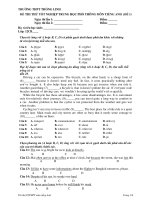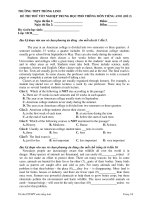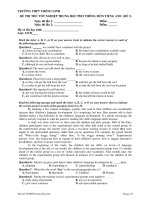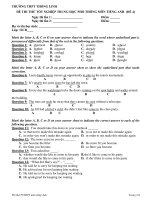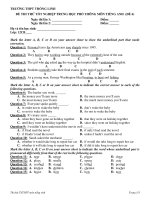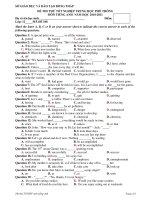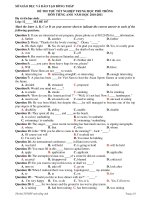- Trang chủ >>
- THPT Quốc Gia >>
- Ngoại Ngữ
Đề thi thử tốt nghiệp THPT năm 2021 2022 môn tiếng anh THPT thiệu hóa thanh hóa lần 1 (file word có lời giải) image marked
Bạn đang xem bản rút gọn của tài liệu. Xem và tải ngay bản đầy đủ của tài liệu tại đây (540.42 KB, 11 trang )
KHẢO SÁT CHẤT LƯỢNG THI TỐT NGHIỆP THPT NĂM 2022
Bài thi: NGOẠI NGỮ; Mơn thi: TIẾNG ANH
THPT THIỆU HĨA - THANH HÓA (LẦN 1)
Thời gian làm bài: 60 phút; 50 câu trắc nghiệm
Read the following passage and mark the letter A, B, C, or D on your answer sheet to
indicate the correct answer to each of the questions from 1 to 5.
Some doctors think that you should drink a glass of water each morning. You should drink
this water first thing, before doing anything else. The temperature of the water should be similar
to body temperature; neither too hot nor too cold. If you drink a glass of water which is too
cold, it can cause an imbalance to the body and slow down the digestive process. Besides,
drinking too hot water can bring about some serious side effects such as extensive damage to
the tissue and other organs.
Why should you drink this water? Water helps your body in many ways. It helps clean out
your kidneys. It prepares your stomach for digestion. Water can also help your intestines work
better. After drinking water, the intestines can more easily take out nutrients from our food.
Water also helps US go to the bathroom more easily.
Scientists suggest that people take in 1,600 milliliters of water each day. But don't drink all
of that water in one sitting. If you do, your kidneys will have to work much harder to eliminate
it. It's better to drink some in the morning and some in the afternoon. Some people think it's
better to drink between meals and not during meals. They think water dilutes the juices
produced in our stomachs. This can interfere with normal digestion. Are you drinking enough
water every day? Check the color of your urine. If it is light yellow, you are probably drinking
enough. If your urine is very dark yellow, you probably need to drink more water. A little more
water each day could make you much healthier.
(Adapted from Reading Challenge 1 by Casey Malareher and Andrea Janzen)
Question 1: What is the main idea of the passage?
A. How to drink water correctly?
B. The importance of water
C. The advice of the doctors
D. The best amount of water to drink
Question 2: The word "which" in paragraph 1 refers to ________ .
A. water
B. a glass of water
C. water temperature
D. body temperature
Question 3: According to the passage, water is good for the following organs of the body,
EXCEPT __________.
A. kidneys
B. stomach
C. livers
D. intestines
Question 4: The word "eliminate" in paragraph 3 is closest in meaning to _________ .
A. process
B. preserve
C. remove
Question 5: Which of the following is NOT true?
A. You need to drink more water if your urine is light yellow.
D. absorb
B. Drinking water while having meals may interfere with normal digestion.
C. You shouldn't drink too much water at the same time.
D. The first thing you should do every morning is to drink water.
Mark the letter A, B, C, or D on your answer sheet to indicate the correct answer to each of
the following questions from 6 to 20.
Question 6: Meghan Markle, became a member of British Royal Family upon her_________to
Prince Harry on May 19th, 2018, is an American actress and humanitarian.
A. married
B. marrying
C. marriage
D. marry
Question 7: She finally achieved her ____ of visiting the USA.
A. desires
B. objective
C. target
D. ambition
Question 8: __________every major judo title, Mark retired from international competition.
A. Having won
B. On winning
C. When he won
D.Winning
Question 9: __________his employees will have worked for two hours.
A. By the time the boss arrives
B. When the boss arrives
C. Only when the boss arrives
D. After the boss arrives
Question 10: Drinking too much alcohol is said to ________ harm to our health.
A. make
B. lead
C. do
D. take
Question 11: Governments decided to take __________ measures to deal with terrorism.
A. threshing
B. tough
C. enormous
D. profound
Question 12: Helen has just bought _____________ scarves.
A. wool black new
B. new wool black
C. black wool new
D. new black wool
Question 13: The escaped prisoner fought before he was finally overpowered.
A. head over heels
B. heart and soul
C. tooth and nail
D. foot and mouth
Question 14: __________ I've cleaned it and polished it, it still doesn't look new.
A. Because
B. Although
C. While
D. In spite of
Question 15: Everyone hopes to gain physical health, ___________ ?
A. doesn't she
B. don't they
C. doesn't he
D. do they
Question 16: We ______ to the hospital to visit Mike when he ______to say that he was fine.
A. drove - called
B. were driving - was calling
C. were driving - called
D. drove - was calling
Question 17: What chemical is this? It's _______ a horrible smell.
A. giving off
B. giving over
C. giving down
D. giving up
Question 18: Is he capable _____ doing such a hard job?
A. in
B. of
C. for
D. with
Question 19: Today, many serious childhood diseases _____ by early immunization.
A. can be prevented
B. prevent
C. are preventing
D. can prevent
Question 20: The more you practice speaking in public, ________ .
A. the greater confidence you become
B. the more you become confidently
C. the more you become confident
D. the more confident you become
Mark the letter A, B, C, or D on your answer sheet to indicate the word(s) CLOSEST in
meaning to the underlined word in each of the following questions from 21 to 22.
Question 21: There must be a mutual trust between friends.
A. belief
B. suspicion
C. defendant
D. reliance
Question 22: He seems to make the same mistake over and over again
A. repeatedly
B. in vain
C. by the way
D. for good
Read the following passage and mark the letter A, B, C, or D on your answer sheet to
indicate the correct word or phrase that best fits each of the numbered blanks from 23 to 27.
Father's Day was created to complement Mother's Day. Like Mother's Day (23) ____ honors
mothers and motherhood, Father's Day celebrates fatherhood and paternal bonds; it highlights
the (24) ________ of fathers in society. Many countries celebrate it on the third Sunday of June,
but it is also celebrated widely on other days. Historically, Sonora Smart Dodd was the woman
behind the celebration of male parenting. Her father, the Civil War veteran William Jackson
Smart, was a single parent who (25) _______ his six children there. After hearing a sermon
about Jarvis' Mother's Day in 1909, she told her pastor that fathers should have a similar
holiday honoring them. Although she initially suggested June 5, her father's birthday, the
pastors did not have enough time to prepare their sermons, and the celebration was deferred to
the third Sunday of June. The first celebration was in Spokane. Washington at the YMCA
Young Men's Christian Association) on June 19, 1910. Since then it has become a traditional
day (26) _________year.
In recognition of what fathers do for their families, on this day people may have a party
celebrating male parenting or simply make a phone call or send a greeting card. (27)_____,
schools help children prepare handmade gifts for their fathers many days before the celebration.
Question 23: A. who
B. where
C. when
D. which
Question 24: A. impact
B. influence
C. conquest
D. effect
Question 25: A. made
B. raised
C. took
D. realized
Question 26: A. another
B. any
C. other
D. every
C. Besides
D. In contrast
Question 27: A. However B. Then
Mark the letter A, B, C, or D on your answer sheet to indicate the under in each of the
following questions from 28 to 30.
Question 28: The boy has a lot of toy cars, but he never plays with it.
A. but
B. never
C. has
D. it
Question 29: They have carried out exhausting research into the effects of smartphones on
schoolchildren's behaviour and their academic performance.
A. into
B. academic performance C. behaviour
Question 30: He begins to study English three years ago.
D. exhausting
A. to study
B. three years
C. English
D. begins
Mark the letter A, B, C, or D on your answer sheet to indicate the word whose underlined
part differs from the other three in pronunciation in each of the following questions from 31
to 32.
Question 31: A. false
B. laugh
C. after
D. glass
Question 32: A. removed
B. rained
C. washed
D. changed
Mark the letter A, B, C, or D on your answer sheet to indicate the sentence that best
combines each pair of sentences in the following questions from 33 to 34.
Question 33: I didn't invite her to the party. I'm really sorry now.
A. As long as his parents are at home, they will be able to help him.
B. If only I had been sorry and could have invited her to the party.
C. I really wish I had invited her to the party.
D. If I were you, I had invited her to the party.
Question 34: They finished one project. They started working on the next.
A. Hardly had they finished one project when they started working on the next.
B. Only if they had finished one project did they start working on the next.
C. Had they finished one project, they would have started working on the next.
D. Not until did they start working on the next project then they finished one.
Mark the letter Ay By Cy or D on your answer sheet to indicate the word that differs from the
other three in the position of stress in each of the following questions from 35 to 36.
Question 35: A. verbal
B. common
C. social
D. polite
Question 36: A. intellectual
B. unexpected
C. dedicated
D. pessimistic
Mark the letter Ay By Cy or D on your answer sheet to indicate the sentence that is closest in
meaning to each of the following questions from 37 to 39.
Question 37: "What are you going to do after school, Anne?" Kevin asked.
A. Kevin asked Anne what was she going to do after school.
B. Kevin asked Anne what she was going to do after school.
C. Kevin wanted to know what would Anne do after school.
D. Kevin wanted to know what Anne would do after school.
Question 38: The last time I went swimming was when we were in Spain.
A. I used to go swimming when I visited Spain.
B. I have not gone swimming since we were in Spain.
C. We often went swimming together when we were in Spain.
D. I always went swimming when we were in Spain.
Question 39: Sally paid for her travel in advance, but it wasn't necessary.
A. Sally couldn’t have paid for her travel in advance.
B. Sally may not have paid for her travel in advance.
C. Sally needn't have paid for her travel in advance.
D. Sally might not have paid for her travel in advance.
Mark the letter Ay By Cy or D on your answer sheet to indicate the sentence that best
completes each of the following exchanges from 40 to 41.
Question 40: Jenny and Jimmy are talking about university education.
- Jenny: “I think having a university degree is the only way to succeed in life.”
- Jimmy: “ _____ . There were successful people without a degree.”
A. I don't quite agree.
B. That's life.
C. I can't agree more.
D. That's all right.
Question 41: Lien was walking her dogs in the park, she met Lan accidentally.
- Lan: “How lovely your pets are!”
- Lien: “ _________ .”
A. I love them, too
B. Can you say that again
C. Really? They are
D. Thank you, it's nice of you to say so
Read the following passage and mark the letter A, B, C, or D on your answer sheet to
indicate the correct answer to each of the questions from 42 to 48.
Culture is a word in common use with complex meanings, and is derived, like the term
broadcasting, from the treatment and care of the soil and of what grows on it. It is directly
related to cultivation and the adjectives cultural and cultured are part of the same verbal
complex. A person of culture has identifiable attributes, among them a knowledge of and
interest in the arts, literature, and music. Yet the word culture does not refer solely to such
knowledge and interest nor, indeed, to education. At least from the 19th century onwards, under
the influence of anthropologists and sociologists, the word culture has come to be used
generally both in the singular and the plural (cultures) to refer to a whole way of life of people,
including their customs, laws, conventions, and values.
Distinctions have consequently been drawn between primitive and advanced culture and
cultures, between elite and popular culture, between popular and mass culture, and most
recently between national and global cultures. Distinctions have been drawn too between
culture and civilization; the latter is a word derived not, like culture or agriculture, from the soil,
but from the city. The two words are sometimes treated as synonymous. Yet this is misleading.
While civilization and barbarism are pitted against each other in what seems to be a perpetual
behavioural pattern, the use of the word culture has been strongly influenced by conceptions of
evolution in the 19th century and of development in the 20th century. Cultures evolve or
develop. They are not static. They have twists and turns. Styles change. So do fashions. There
are cultural processes. What, for example, the word cultured means has changed substantially
since the study of classical (that is, Greek and Roman) literature, philosophy, and history ceased
in the 20th century to be central to school and university education. No single alternative focus
emerged, although with computers has come electronic culture, affecting kinds of study, and
most recently digital culture. As cultures express themselves in new forms not everything gets
better or more civilized.
The multiplicity of meanings attached to the word made and will make it difficult to define.
There is no single, unproblematic definition, although many attempts have been made to
establish one. The only non-problematic definitions go back to agricultural meaning (for
example, cereal culture or strawberry culture) and medical meaning (for example, bacterial
culture or penicillin culture). Since in anthropology and sociology we also acknowledge culture
clashes, culture shock, and counter-culture, the range of reference is extremely wide.
Question 42: According to the passage, the word culture ___________.
A. comes from a source that has not been identified.
B. is related to the preparation and use of land for farming
C. derives from the same root as civilization does
D. develops from Greek and Roman literature and history
Question 43: It is stated in paragraph 1 that a cultured person _________.
A. has a job related to cultivation
B. does a job relevant to education
C. takes care of the soil and what grows on it
D. has knowledge of arts, literature, and music
Question 44: The author remarks that culture and civilization are the two words that ________.
A. have nearly the same meaning
B. share the same word formation pattern
C. are both related to agriculture and cultivation
D. do not develop from the same meaning
Question 45: It can be inferred from the passage that since the 20th century _______ .
A. schools and universities have not taught classical literature, philosophy, and history
B. all schools and universities have taught classical literature, philosophy, and history
C. classical literature, philosophy, and history have been considered as core subjects
D. classical literature, philosophy, and history have not been taught as core subjects
Question 46: The word "it" in paragraph 1 refers to _________ .
A. treatment
B. culture
C. soil
D. meanings
Question 47: The word "static" in paragraph 2 could best be replaced by “ _________
A. dense
B. unchanged
C. balanced
D. regular
Question 48: Which of the following is NOT stated in the passage?
A. Anthropology and sociology have tried to limit the references to culture.
B. The use of the word culture has been changed since the 19th century.
C. Distinctions have been drawn between culture and civilization.
D. The word culture can be used to refer to a whole way of life of people.
Mark the letter A, B, C, or D on your answer sheet to indicate the word(s) OPPOSITE in
meaning to the underlined word(s) in each of the following questions from 49 to 50.
Question 49: This tapestry has a very complicated pattern.
A. obsolete
B. ultimate
C. simple
D. intricate
Question 50: You're 25 years old, but you still haven't cut the apron strings.
A. relied on others
B. bought a new house
C. started doing well
D. become independent
KHẢO SÁT CHẤT LƯỢNG THI TỐT NGHIỆP THPT NĂM 2022
Bài thi: NGOẠI NGỮ; Mơn thi: TIẾNG ANH
THPT THIỆU HĨA - THANH HÓA (LẦN 1)
Thời gian làm bài: 60 phút; 50 câu trắc nghiệm
LỜI GIẢI CHI TIẾT
Read the following passage and mark the letter A, B, C, or D on your answer sheet to
indicate the correct answer to each of the questions from 1 to 5.
Some doctors think that you should drink a glass of water each morning. You should drink
this water first thing, before doing anything else. The temperature of the water should be similar
to body temperature; neither too hot nor too cold. If you drink a glass of water which is too
cold, it can cause an imbalance to the body and slow down the digestive process. Besides,
drinking too hot water can bring about some serious side effects such as extensive damage to
the tissue and other organs.
Why should you drink this water? Water helps your body in many ways. It helps clean out
your kidneys. It prepares your stomach for digestion. Water can also help your intestines work
better. After drinking water, the intestines can more easily take out nutrients from our food.
Water also helps US go to the bathroom more easily.
Scientists suggest that people take in 1,600 milliliters of water each day. But don't drink all
of that water in one sitting. If you do, your kidneys will have to work much harder to eliminate
it. It's better to drink some in the morning and some in the afternoon. Some people think it's
better to drink between meals and not during meals. They think water dilutes the juices
produced in our stomachs. This can interfere with normal digestion. Are you drinking enough
water every day? Check the color of your urine. If it is light yellow, you are probably drinking
enough. If your urine is very dark yellow, you probably need to drink more water. A little more
water each day could make you much healthier.
(Adapted from Reading Challenge 1 by Casey Malareher and Andrea Janzen)
Giải thích:
Dịch bài
Một số bác sĩ cho rằng bạn nên uống một cốc nước vào mỗi buổi sáng. Bạn nên uống nước
trước khi làm bất cứ điều gì khác. Nhiệt độ của nước phải tương đương với nhiệt độ cơ thể;
khơng q nóng cũng không quá lạnh. Nếu bạn uống một cốc nước q lạnh thì nó có thể gây
mất cân bằng cho cơ thể và làm chậm q trình tiêu hóa. Bên cạnh đó, uống nước quá nóng có
thể mang lại một số tác dụng phụ nghiêm trọng như tổn thương mô và các cơ quan khác trên
diện rộng.
Tại sao bạn nên uống một cốc nước vào buổi sáng? Nước giúp ích cho cơ thể của bạn theo
nhiều cách. Nó giúp làm sạch thận của bạn. Nó chuẩn bị cho dạ dày của bạn để tiêu hóa. Nước
cũng có thể giúp ruột của bạn hoạt động tốt hơn. Sau khi uống nước, ruột có thể dễ dàng lấy
chất dinh dưỡng từ thức ăn của chúng ta hơn. Nước cũng giúp chúng ta đi vệ sinh dễ dàng hơn.
Các nhà khoa học đề xuất rằng mọi người nên nạp 1.600 ml nước mỗi ngày. Nhưng đừng uống
hết số nước đó trong một lần. Nếu bạn làm vậy, thận của bạn sẽ phải làm việc nhiều hơn để đào
thải nó. Tốt hơn bạn nên uống một ít vào buổi sáng và một ít vào buổi chiều. Một số người nghĩ
rằng tốt hơn là nên uống giữa các bữa ăn và không nên uống trong bữa ăn. Họ cho rằng nước
sẽ làm loãng dịch tiết trong dạ dày của chúng ta. Điều này có thể cản trở q trình tiêu hóa
bình thường. Bạn có uống đủ nước mỗi ngày khơng? Kiểm tra màu sắc của nước tiểu. Nếu nó
có màu vàng nhạt, có lẽ bạn đã uống đủ. Nếu nước tiểu của bạn có màu vàng đậm, có lẽ bạn
cần uống thêm nước. Thêm một chút nước mỗi ngày có thể giúp bạn khỏe mạnh hơn nhiều.
Question 1: What is the main idea of the passage?
A. How to drink water correctly?
B. The importance of water
C. The advice of the doctors
D. The best amount of water to drink
Giải thích:
Kiến thức đọc hiểu:
Ý chính của đoạn văn này là gì?
A. Uống nước thế nào là hợp lý?
B. Tầm quan trọng của nước
C. Lời khuyên của các bác sĩ
D. Lượng nước phù hợp nhất để uống
Căn cứ vào các thông tin:
- Some doctors think that you should drink a glass of water each morning. (Một vài bác sĩ
khuyên bạn nên uống một cốc nước vào mỗi buổi sáng).
- Why should you drink this water? (Tại sao bạn lại nên uống nước này?)
→ Như vậy, nội dung bài đọc đang xoay quanh tầm quan trọng của nước.
→ Chọn đáp án B
Question 2: The word "which" in paragraph 1 refers to ________ .
A. water
B. a glass of water
C. water temperature
D. body temperature
Giải thích:
Kiến thức đọc hiểu:
Từ "which" trong đoạn 1 đề cập đến ______.
A. nước
B. một cốc nước
C. nhiệt độ nước
D. nhiệt độ cơ thể
Dẫn chứng: If you drink a glass of water which is too cold, it can cause an imbalance to the
body and slow down the digestive process. Besides, drinking too hot water can bring about
some serious side effects such as extensive damage to the tissue and other organs.
Nếu bạn uống một cốc nước quá lạnh, nó có thể gây mất cân bằng cho cơ thể và làm chậm q
trình tiêu hóa. Bên cạnh đó, uống nước quá nóng có thể mang lại một số tác dụng phụ nghiêm
trọng như tổn thương mô và các cơ quan khác trên diện rộng.
→ Chọn đáp án B
Question 3: According to the passage, water is good for the following organs of the body,
EXCEPT __________.
A. kidneys
B. stomach
C. livers
D. intestines
Giải thích:
Kiến thức đọc hiểu:
Theo đoạn văn, nước rất tốt cho các bộ phận trong cơ thể, ngoại trừ __________.
A. thận
B. dạ dày
C. gan
D. ruột
Căn cứ thông tin đoạn 2: Water helps your body in many ways. It helps clean out your kidneys.
It prepares your stomach for digestion. Water can also help your intestines work better. After
drinking water, the intestines can more easily take out nutrients from our food.
(Nước giúp cơ thể bạn theo nhiều cách. Nó có thể giúp bạn làm sạch thận. Nó giúp dạ dày
chuẩn bị sẵn sàng để tiêu hóa thức ăn. Nước cũng có thể làm cho ruột bạn hoạt động tốt hơn.
Sau khi uống nước, đường ruột có thể dễ dàng hấp thu dưỡng chất từ thức ăn hơn.)
→ Chọn đáp án C
Question 4: The word "eliminate" in paragraph 3 is closest in meaning to _________ .
A. process
B. preserve
C. remove
D. absorb
Giải thích:
Kiến thức:
Từ “eliminate” trong đoạn 3 gần nghĩa nhất với từ ____________.
A. xử lý
B. duy trì
C. loại bỏ
D. hấp thụ
eliminate (loại bỏ) = remove
→ Chọn đáp án C
Question 5: Which of the following is NOT true?
A. You need to drink more water if your urine is light yellow.
B. Drinking water while having meals may interfere with normal digestion.
C. You shouldn't drink too much water at the same time.
D. The first thing you should do every morning is to drink water.
Giải thích:
Kiến thức đọc hiểu:
Câu nào sau đây là không đúng?
A. Bạn nên uống thêm nước nếu nước tiểu màu vàng nhạt.
B. Uống nước trong khi đang dùng bữa có thể can thiệp đến sự tiêu hóa thơng thường.
C. Bạn khơng nên uống q nhiều nước một lúc.
D. Điều đầu tiên bạn nên làm mỗi buổi sáng là uống nước.
Căn cứ các thông tin sau:
- D đúng vì: Some doctors think that you should drink a glass of water each morning. You
should drink this water first thing, before doing anything else.
(Một vài bác sĩ khuyên bạn nên uống một cốc nước vào mỗi buổi sáng. Bạn nên uống nước
trước tiên, trước khi làm bất kì việc gì khác).
- C đúng vì: Scientists suggest that people take in 1,600 milliliters of water each day. But don’t
drink all of that water in one sitting.
(Các nhà khoa học đề nghị mỗi người nên uống 1,6 lít nước mỗi ngày. Nhưng dùng uống tất cả
số nước đó trong 1 lần).
- B đúng vì: Some people think it’s better to drink between meals and not during meals. They
think water dilutes the juices produced in our stomachs. This can interfere with normal
digestion.
(Vài người cho rằng tốt hơn là uống nước giữa các bữa ăn và không uống trong khi ăn. Họ cho
rằng nước sẽ làm loãng dung dịch tiết ra trong dạ dày. Điều này có thể ngăn cản sự tiêu hóa
thơng thường).
- A sai vì: Check the color of your urine. If it is light yellow, you are probably drinking enough.
(Hãy kiểm tra màu nước tiểu của bạn. Nếu nó màu vàng nhạt, bạn hẳn là đã uống đủ nước).
→ Chọn đáp án A
Tải file word để xem đủ nội dung
Question 50: You're 25 years old, but you still haven't cut the apron strings.
A. relied on others
B. bought a new house
C. started doing well
D. become independent
Giải thích:
Kiến thức về từ trái nghĩa:
cut the apron strings: độc lập
A. relied on others: phụ thuộc, dựa dẫm vào người khác
B. bought a new house: mua nhà mới
C. started doing well: bắt đầu làm tốt
D. become independent: độc lập
→ cut the apron strings >< relied on others
Tạm dịch: Bạn đã 25 tuổi rồi, nhưng bạn vẫn chưa sống độc lập được.
→ Chọn đáp án A
